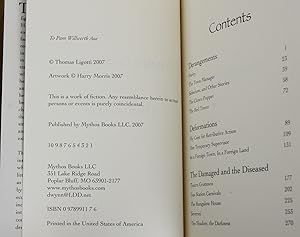
And if you want to tell a story that satisfies the reader's sense of being "about something," at least on a superficial level, while being about something more on a deeper level, simply leave out some exposition, something that would perhaps illuminate what the writer himself may only dimly feel. For instance, if you want to hold a reader's attention throughout what might be an otherwise boring dream scenario, mix in a dose of the banal.

The influence of my masters as mirrored in my stories. Everything in his stories is pregnant with meaning, but precise definitions constantly escape us- just as they do in the sideshow world we call reality.In reply to that comment, after a duly modest acknowledgement that not all readers share my appreciation of his work, Ligotti remarked that I had described It is, I think, Ligotti's mastery of that balance that makes his fiction so unsubtly disturbing on levels both visceral and intellectual. This balance between the formlessness of dreams and the structural rigor of literature is not an easy one to strike, as any study of the myriad unsatisfying dream sequences in all types of contemporary fiction will demonstrate. And yet the story has both the narrative coherence necessary for a satisfying reading experience and a strong philosophical undercurrent. What struck me this time was how it, like so much of Ligotti's work, evokes the incomprehensible experience of nightmare in its surreal but vivid imagery and its paucity of explanation. In a recent discussion on a Ligotti-devoted message board, I remarked after rereading it that the story "The Red Tower" And Thomas Ligotti remains one of the premier contemporary authors of such fiction. I retain, however, my enthusiasm for fiction that expresses this view, fiction that is, like the essay and monograph mentioned above, itself a form of sublimation.

I still regard the pessimistic view of existence as accurate I just don't find it very interesting. As time has passed, I've found my interest in sublimation limited, and moved on to distraction, amusing myself with entertainments and getting caught up in the business of daily life. I first encountered this framework in an early draft version of Thomas Ligotti's monograph The Conspiracy Against the Human Race, which transformed my own mechanism from anchoring (constructing the illusion that certain principles transcend or defy the horror of existence) to sublimation (acknowledging that horror but using the knowledge of its existence as a source of action and consolation). In his essay "The Last Messiah," Peter Wessel Zapffe identifies four mechanisms by which human beings avoid dwelling on the inherently tragic nature of human life: isolation, anchoring, distraction, and sublimation. Thomas Ligotti, "The Mystics of Muelenburg"

"Where I live is nightmare, thus a certain nonchalance."


 0 kommentar(er)
0 kommentar(er)
